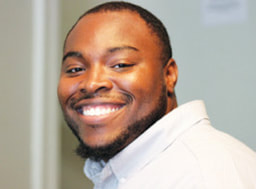|
A Conversation with Case Manager & Residence Life Coordinator, Jumar Peterson  Residence Life Coordinator, Jumar Peterson Residence Life Coordinator, Jumar Peterson In the summer of 2014, shortly after graduating from James Madison University with a degree in psychology, Jumar Peterson joined the Gemeinschaft Home staff as a case manager and residence life coordinator. Having previously worked for the organization as a part-time shift supervisor, Peterson hit the ground running in the new position, becoming an integral part of the three-person team (with executive director Sharon Glick and program director Richi Yowell) in charge of the day-to-day operations of Gemeinschaft Home. Like his co-workers, Peterson points to the synergy of their group as critical to the success of the program, emphasizing that “we all have an authentic level of care for the guys, and while we all bring certain aspects of who we are as we evaluate any situation, we work together well as team.” Peterson works closely with residents, both in groups and in one-on-one discussions, and the experiences he has gained over the last year have had an impact on where he sees himself going in the future. While he never planned to work with the current population of Gemeinschaft Home, Peterson always knew that he was destined for a career in serving others, “because that is what my heart is for, my heart is positioned to help people,” he explains. In fact, his own life experiences have given Peterson insight that he now brings to his interactions with residents, pointing out, “My father has struggled with substance abuse issues for my whole life,” and that “living through his addiction, I never thought I would be a counselor for people with addiction; it kind of came full circle.” When asked to characterize the overall nature of his work, Peterson says, “My goal is to restore hope, to let guys know that there is hope for them, that their life does have meaning and a purpose, and that they affect other people around them (whether they realize it or not).” He adds, “My mission, more than anything, is to let people know this isn’t the end of the road for them, because people can either feel stuck or they can look at this moment as a platform to launch. So, I try to identify wherever they are and to help them transition better.” As the youngest full-time staff member who is also fresh out of college, Peterson faces daily challenges. Yet, “One thing I have learned is to be authentically me, and that breeds a certain type of genuineness, and I think the guys here pick up on that, he explains, but adds, “I struggle, too. This is my first ‘grown-up job,’ and so a lot of this is new to me. I just try to be me, and I have realized that being me has value.” Peterson points out, “I have life experiences that are helpful to the guys here; I can relate to a certain degree.” For example, “through some of my conversations with my dad, I know that a lot of guys who struggle with substance abuse issues feel alone, abandoned, and rejected. They feel a lot of regret, guilt, and shame.” Consequently, Peterson argues that his most productive group sessions with residents are about those things “he has processed” himself, that he “can internalize and project.” In other words, he says, “I am not teaching a concept, I am teaching stuff that I have experienced, that I know to be true. That is the difference from just putting together some information to discuss.” Peterson’s greatest desire for residents is to see that “even though they have made a mistake, they are still valuable as people.” The benefit of the effort is apparent, “When I see guys being appreciative of their lives and what they can do, when they can have that joy or excitement about life, never to neglect the fact that it was a struggle, but to see that they are working through it, that is the greatest reward.” |
Archives
August 2023
|